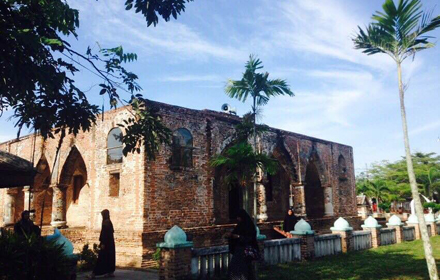11 years on since Krue Se incident, it seems the lesson has not been learned
Eleven years ago on April 28, a series of violent incidents gripped the Deep South with the main focus at Krue Se mosque in Pattani where government forces battled suspected militants around the mosque before finally storming the mosque with heavy weapons in order to force out a group of suspects taking refuge in the mosque.

By the time that violence ended at sundown, altogether 107 suspected militants and one government official were killed. Inside the mosque itself, 32 people died.
The violence on that day which was later called the Krue Se incident has inflicted a deep scar in the minds of many Malay Muslims in the three southernmost provinces. It was cited as one of the symbolic causes of armed struggle for a separate homeland waged by militant groups against the government ever since.
For the past 11 years, more than 200 billion baht have since been poured into the restive region by eight governments to fight the insurgency war and for development projects to improve the livelihood of the people under the sterotype belief that once the people are employed and live a better life, the insurgency will phase out and violence eases.
But it is wrong. Violence still rages today on almost daily basis and people still get killed. And the insurgency war still rages. Because the real wound inflicted by the past governments – that is injustice – has not been addressed and healed.
The Krue Se incident took place during the government of then prime minister Thaksin Shinawatra. After the incident, the government set up an independent fact-finding committee led by Mr Suchinda Yongsunthorn to probe the event.
The committee made an observation that the military operation to storm the mosque and the commander in charge of the operation were at fault for not being discreet without any regard for subsequent consequences. Yet, not a single government official was charged in the court.
Ms Koriyoh Halee who lost her father in the incident told Isranews agency that when there was no case in the court, it could not be proven which side was wrong.
The only case related to the incident which went through three stages of the court was the one in which Abdul Roning Jehloh was charged for involvement in the attack of Mae Larn district police station in Pattani which took place on the same day.
The defendant denied all along that he was not involved in the attack but was forced to drive the militants to attack the station. The Supreme Court found him guilty and upheld the life sentence imposed by the lower courts.
Abdul Roning’s wife, Mrs Sitinor, said because of the court trial she was denied compensation from the state despite the fact that the defendant was badly wounded in the incident.
For many Malay Muslims in the Deep South, the trial of security-related cases in the Deep South has become an obstacle in the restoration of justice in their society. They strongly feel that while many Malay Muslims were charged in the court, rarely any government officials were subjected to the same treatment.
Of all the security-related cases, 80 percent of them were later acquitted by the court for lack of evidences. Although the defendants were acquitted, many of them had already served 3-5 years in jail during the trial.
But it seems that government after government has not learned the lesson and has not treated the injustice problem seriously.
The Pulo Puyo incident on January 29, 2012 is yet another case that many locals strongly feel justice is evasive and has not been served on the wrongdoers. In this incident, paramilitary rangers shot up a pickup truck loaded with passengers killing several of them in Pattani’s Nong Chik district.
The sister of one of the victims, Ms Adidah Bueraheng, told Isranews agency that so far she didn’t know any officials were charged and put on trial.
Recently in March, paramilitary rangers killed four innocent people, two of them students, in a botched house raid in Pattani’s Thung Yang Daeng district.
Mr Mahama Senleh, father of one of the dead victims, said he would like to see the perpetrators in this incident punished in accordance with the law.
President of the Federation of Patani Students or Purmas, Mr Suhaimee Dulasa, said that local people still talk about the Krue Se incident and still feel strongly about it even though the government has repeatedly told them to stop mentioning it in order not to provoke the old wound.
He suggested the government to overhaul the justice system to ensure justice for the local people and not to hide problems under the rug but to bring them up for talks with all parties concerned.
Pol Lt-Gen Anurut Krisanakaraket, commander of the southern border police operations centre, said view the local people with a more positive light and try harder to approach them to create better mutual understanding.
He suggested that special law should not be used too frequently and, more importantly, the government must ensure justice prevails for all.
----------------------------------------------------------------------------------------------------------------------------------------------------------
Caption : Kruese mosque
